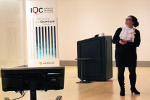CryptoWorks21 offers successful workshop on Standards and Standardization

CryptoWorks21 convened a valuable workshop on standards and standardization in the Mike & Ophelia Lazaridis Quantum Nano Centre on January 11. The workshop was intended to introduce companies and academics in the quantum / cryptography ecosystem to the pertinent features of the standards landscape. There is a growing awareness of the strategic value of standards to export-ready companies and of the need for more Canadian organizations to become engaged in standardization efforts as a means of accessing global markets.
Hosted by Dr. Michele Mosca, the workshop featured presentations by Mariane Huard, Sector Specialist with the Standards Council of Canada (SCC), and Mark Pecen, Senior Executive at ISARA Corporation and Chair of the Technical Committee Cyber working group for Quantum-Safe Cryptography (Cyber QSC) at the European Telecommunications Standards Institute (ETSI).
Mariane Huard walked attendees through a helpful deck that moved from the basics of standards (which are published documents that establish specifications and procedures) and standardization (the preparation and adoption of, and conformity to, standards), to the place of standards at various points in the innovation process, to standardization trends in the ICT sector, to the numerous international standardization efforts focused specifically on quantum-safe cryptography.
Ms. Huard closed with a description of SCC's assistance to Canadian businesses as part of its work in supporting Canada's Innovation and Skills Plan. By working directly with Canadian innovators, SCC is providing tailored, end-to-end support to companies in developing effective standardization strategies to accelerate commercialization and remove barriers to the adoption of new Canadian technologies. Investing in standards development and conformity assessment activities is one way Canadian innovators are able to lead the creation of new markets, encourage complimentary innovation, influence future market rules and enhance market access.
Mark Pecen followed with a thought-provoking presentation titled "Standardization: A double-edged sword?" Workshop attendees heard both the positives and the negative sides of standardization; the positives, which are more obvious, include equipment interoperability, economies of scope, large-scale adoption potential and economies of scale. The negatives, which tend to be more nebulous, include the resulting constraints on future innovation because of the large 'switching' cost. Still, non-participation has severe consequences, including loss of industry leadership, the need to pay royalties because you weren't at the table developing the standard, and being late to market. Mr. Pecen went on to stress the importance of government and academic participation in standardization. Having government involved will help ensure that industry standards and public policy are not in conflict. Having academics involved brings more innovations into the standardization process earlier, and also provides academics with opportunities to test their ideas in the commercial world.
Following an active Q&A session, participants were offered the opportunity to meet with Ms. Huard to learn more about SCC services in support of standards and innovation, or with IQC experts in quantum-safe cryptography.
